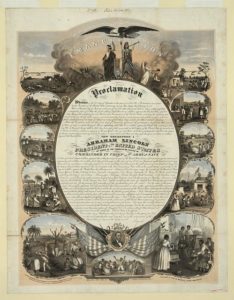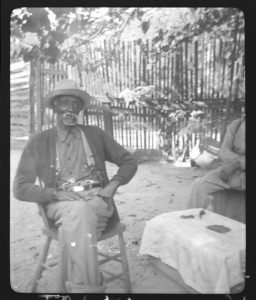Juneteenth

Emancipation Proclamation. Lithograph by L. Lipman, Milwaukee, Wisc., Feb. 26, 1864. Prints and Photographs Division of the Library of Congress.
As of June 17, 2021, Juneteenth is now a Federal holiday.
Today marks the 156th anniversary of Juneteenth, the oldest nationally celebrated commemoration of the ending of enslavement in the United States. Two years after the Emancipation Proclamation, on June 19th, 1865, Major General Gordon Granger led Union soldiers into Galveston, Texas, with the news that the War was over and enslavement was abolished. According to Juneteenth.com, there are several guesses as to why the two year delay. Some speculate, that the messenger carrying the notice from the Federal government was murdered. Another theory assumes, that the information was withheld by enslavers hoping to continue to have labor for their cotton harvests.
Pres. Abraham Lincoln’s Emancipation Proclamation had little impact on the people of Texas, since there were few Union troops around at the time to enforce it. But, with the surrender of Gen. Robert E. Lee in April 1865 and the arrival of Gen. Gordon Granger’s regiment in Galveston, troops were finally strong enough to enforce the executive order. Newly freed men rejoiced, originating the annual “Juneteenth” celebration, which commemorates the freeing of the enslaved people in Texas.
Although Juneteenth has been informally celebrated each year since 1865, it wasn’t until June 3, 1979, that Texas became the first state to proclaim Juneteenth an official state holiday.

Billy McCrea, a former enslaved person who remembered the Union troops coming into Texas in 1865 and being told that he was free. Photo by Ruby Terrill Lomax, September 30, 1940.
“And by virtue of the power, and for the purpose aforesaid, I do order and declare that all persons held as slaves within said designated States, and parts of States, are, and henceforward shall be free; and that the Executive government of the United States, including the military and naval authorities thereof, will recognize and maintain the freedom of said persons.”
~ President Abraham Lincoln, Emancipation Proclamation, January 1, 1863
Juneteenth Resources and Local Events:
Resources:
- PPL resources regarding Juneteenth and Emancipation.
- To find a list of African American parks from the National Parks Service, please click here.
- For recordings of former Texas enslaved people, please click here.
- For African American Culture in Maine, please click here.
- To find information on African American genealogy from the Library of Congress, please click here.
- The Freedmen’s Bureau Project has compiled nearly 1.8 million records of men, women and children, searchable online. To use this database to find your African American ancestry, please click here.
- For the “resolution recognizing the historical significance of Juneteenth Independence Day and expressing the sense of the Senate that history should be regarded as a means for understanding the past and solving the challenges of the future” by the 111th US Congress, please click here.
- For the African American Biographical Database, collecting information on African Americans from 1790 – 1950, please click here.
- The National Park Service has an interesting article on the Language of Slavery. Please click here.
- For resources on writing and/or teaching about enslavement, please click here.
Events 2021:
- Juneteenth
Portland Juneteenth event continues community dialogue and engagement through active art making.
Congress Square Park
Saturday, June 19, 2021 1pm – 5pm - CYWOC presents
Juneteenth!
with Janaesound, Mosart212, Ali Ali, Rodney Mashia
Saturday, June 19, 2021 8pm
State Theatre Facebook - Black Feminisms Part I: Freedom Fête, Juneteenth Virtual Party
This virtual dance party explores musical innovation as part of the Black legacy.
Saturday, June 19, 2021 1pm – 5pm
For more information, click here. - North End Music & Performing Arts Center presents
JUNETEENTH: Opera in the Key of Freedom
Saturday, June 19, 2021 12:30pm
For Virtual Free Tickets: HERE
tags: About the Library | Adults | Seniors | Art & Culture | Genealogy
